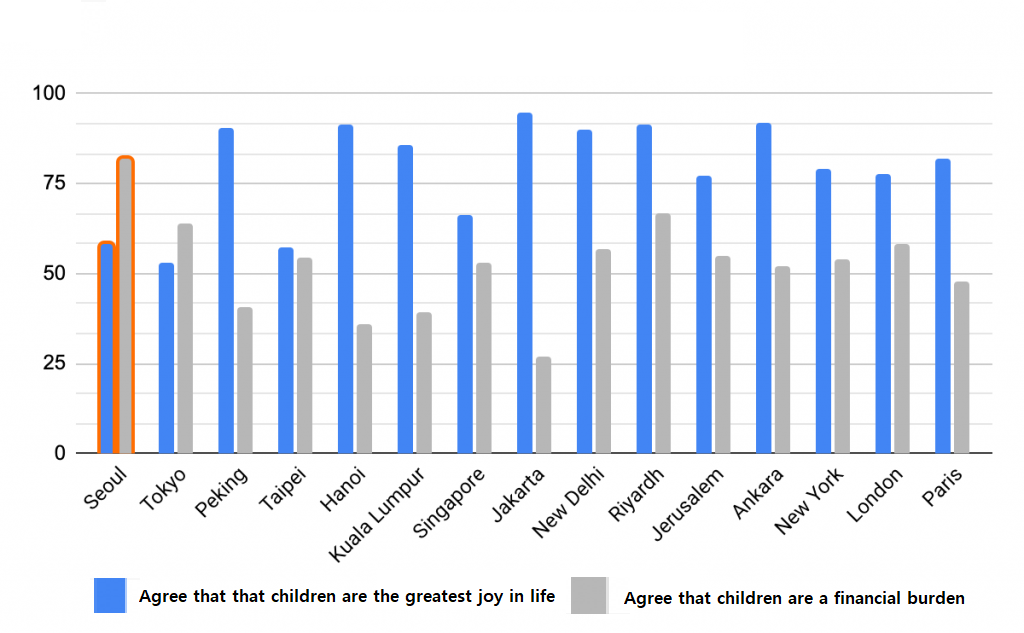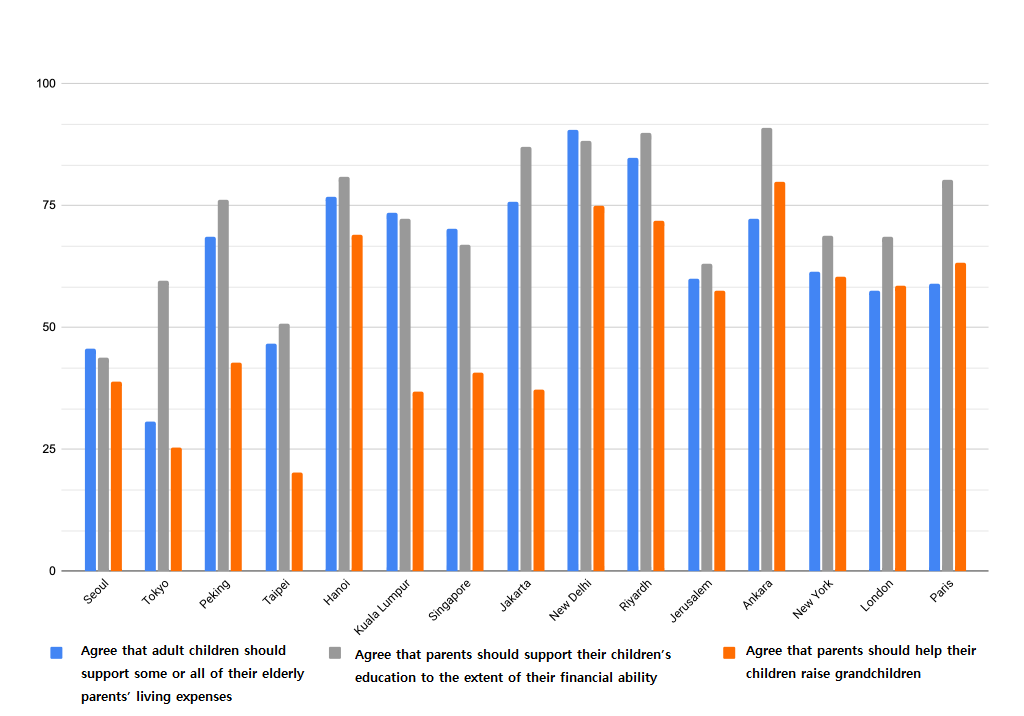Perceptions of Children and Family: Comparisons between Seoul and the Other Cities of the “Social Values Survey in Asian Cities”
The downward trend in South Korea's birth rate has become more severe, reaching a total fertility rate of 0.7, and natural population decline has already begun. Korean society is struggling to come up with countermeasures as the negative effects of population decline appear throughout society.
Many experts have diagnosed various causes and suggested countermeasures for Korea's severely low birth rate, but human society does not exist in a vacuum and it is extremely difficult to clearly establish the causes of such social problems. In an attempt to explore this issue from a broader perspective, ten questions regarding perceptions of marriage, family, and children were included in the “Social Values Survey in Asian Cities.” This article presents the results of analysis undertaken on the survey data, which can provide insights into how family values and the burden of support may impact birth rates.
Raising a child is a fulfilling yet arduous task. The responses to the survey questions regarding the negative aspects of childbearing and childrearing are striking in the way that Seoul sticks out. The percentage of respondents from Seoul between 18-30 years old who agreed that having children is a financial burden is 82 percent, which is overwhelmingly higher than that of the other Asian cities. Additionally, 79 percent thought that the freedom of parents would be restricted when children were born, and 80 percent thought that having children would limit the opportunities for one of the parents to continue with their career. In particular, the percentage of Seoul respondents who agreed that childbearing and childrearing resulted in financial burdens and career restrictions was 20-40 percent higher than that observed in the other cities of the survey. This indicates that the degree to which young adults in Seoul perceived the financial burden of children was much greater than that of the other cities in Asia.
Responses to questions regarding the positive aspects of having children and expectations of financial help from children in old age also showed a similar trend. Only 58 percent of young adults in Seoul agreed that “children are the greatest joy in life,” which is the second lowest percentage after young people in Tokyo (53 percent); in comparison, 77-96 percent of young adults in other cities agreed with such a statement [Fig. 1]. The only cities where the percentage of young adult respondents agreeing to the financial burden of children was higher than the percentage of respondents agreeing that children were the greatest joy in life were Seoul (82 percent > 58 percent) and Tokyo (64 percent > 53 percent). Seoul was also the city where the lowest percentage (39 percent) of young adult respondents agreed that “adult children are a great help in old age.”

Fig. 1: Percentage of young adults who agreed to the statement that children were (1) the greatest joy in life (blue) and (2) a financial burden (grey), according to city. (Figure courtesy of the author, 2023)
Expectations for mutual support among family members was another topic of interest. Questions asked in relation to this were as follows: (1) “Adult children should support some or all of their elderly parents’ living expenses,” (2) “Parents should support their children’s education to the extent of their financial ability,” (3) “Parents should help their children raise grandchildren.” Only 46 percent of young adults in Seoul agreed that adult children should cover the living expenses of their elderly parents, which was the lowest only after Tokyo (31 percent). Only 39 percent of young adults in Seoul agreed that their elderly parents should look after their grandchildren; in Taipei and Tokyo, the percentages were 20 percent and 25 percent, respectively. Additionally, only 44 percent of young adults in Seoul agreed with the statement that “parents should provide maximum support for their children’s education,” which was the lowest among the surveyed cities.

Fig. 2: Percentage of young adults who agreed to the following statements: (1) adult children should support some or all of their elderly parents’ living expenses, (2) parents should support their children’s education to the extent of their financial ability, and (3) parents should help their children raise grandchildren according to city. (Figure courtesy of the author, 2023)
The perceptions of young adults in Seoul that were revealed through the survey are rather shocking. Even if we acknowledge the possibility of there being systematic cultural differences in response patterns in the case of such worldwide surveys, it cannot be denied that the perception of young adults in Seoul regarding childbearing and childrearing is extremely negative compared to those in Asia’s other cities. Therefore, this result of the “Social Values Survey in Asian Cities” indicates the need for further qualitative analysis to be undertaken on the possible contexts that may have resulted in the negative perceptions of children and family for Seoul’s young adults, and to compare those contexts against those of Asia’s other cities.
Jungwon Huh, HK Research Professor, Seoul National University Asia Center, jwhuh@snu.ac.kr